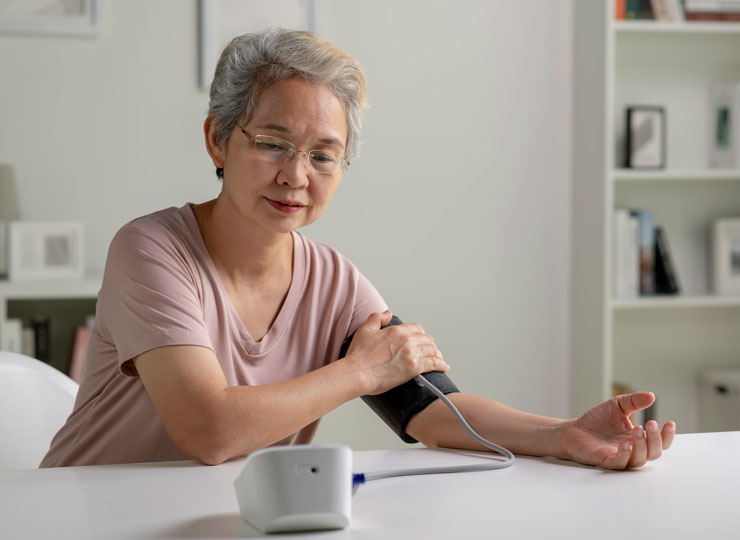
November 29, 2023
Years of research has shown that keeping your blood pressure in check is good not just for the heart but also for the brain, lowering your risk of heart attack, stroke and dementia. Now a new study showed just how effective blood pressure lowering can be in helping to keep the brain in good working order. It found that in older people with high blood pressure, lowering systolic blood (the top number) by an average of 22 points through a rigorous blood pressure treatment program reduced the risk of Alzheimer’s disease and other forms of dementia by 15 percent.
Just recently, the Fisher Center reported on a large analysis of 17 different studies that found that older men and women whose high blood pressure, or hypertension, is under control have no greater risk of dementia than someone without high blood pressure. Older adults who regularly took their blood pressure meds had significantly lower risk of developing Alzheimer’s disease and other forms of dementia than their peers with untreated hypertension.
But those studies were observational, looking at groups of patients at different snapshots in time. This new study directly compared two groups of patients with high blood pressure: One group was given blood pressure meds and carefully monitored to get their blood pressure numbers down, while the other group received standard care.
“Previous observational studies have found that individuals with untreated hypertension have a 42 percent increased risk of dementia compared with healthy adults, while individuals with treated hypertension have no significant increase in dementia risk compared with healthy adults,” said study author Dr. Jiang He, a professor of epidemiology and medicine at Tulane University. “This is the first large, randomized trial to demonstrate that lowering blood pressure is effective in reducing the risk of dementia in people with high blood pressure.”
“In the absence of curative treatments, the primary prevention of dementia through the reduction of risk factors has become a public health priority,” added Dr. He.
For the study, presented at an American Heart Association conference, researchers undertook a four-year program involving around 34,000 adults living across 325 villages in rural China. Their average age was 63. All had untreated high blood pressure of 140/90 or higher, or 130/80 for those with risk factors for heart disease or who were currently taking blood pressure drugs. A healthy blood pressure is generally regarded as 120/80 or lower.
Half of the study participants were randomly assigned to an intensive blood pressure program run by a trained village doctors, who carefully monitored patients with the aim of reducing blood pressure to under 130/80. Patients were given free or low-cost blood pressure medicines, home blood pressure monitors, and coached on dietary and other lifestyle strategies to lower blood pressure. Doctors checked in regularly to make sure they were taking their medications, and to monitor their progress.
The other half were assigned to a usual care group and given standard medical care, which typically involved visits with local doctors at village hospitals. Many also had access to blood pressure medicines, but they were not monitored as closely as the other group.
At the end of four years, the researchers found that the intensive program led to significant improvements in blood pressure control as well as a reduced risk for Alzheimer’s disease and other forms of dementia. The average blood pressure in the intensive group at the end of the study period was 128/73, compared to 148/81 in the usual care group. On average, systolic blood pressure (the top number) decreased by 22 points and diastolic blood pressure decreased by 9 points among people in the intensive group compared to usual care.
In addition, those receiving intensive care has a 15 percent lower risk of dementia, and a 16 percent lower risk of milder memory and thinking problems, compared to the usual care group. Hospitalizations and deaths from all causes was also lower in the intensively monitored group.
High blood pressure is sometimes called the “silent killer” because it often has no symptoms. But it can, over many years, damage blood vessels throughout the body, including in the brain, where blood vessels can be extremely narrow. Hypertension can develop at any age, and other studies have shown that people who develop high blood pressure in their 30s are at high risk of dementia in old age if they don’t treat it properly. High blood pressure becomes increasingly common with advancing age.
Hypertension can arise because of genetic factors, but also because of lack of exercise and a poor diet. Excessive alcohol use or a high-sodium diet, for example, can contribute to high blood pressure in some people.
While the first-line treatment for high blood pressure is regular exercise and a heart-healthy diet, blood pressure medications may be especially important for maintaining memory and thinking skills as we age, as this study confirms. If your doctor prescribes blood pressure drugs, it is important to keep taking them and to have your blood pressure checked regularly.
By ALZinfo.org, The Alzheimer’s Information Site. Reviewed by Eric Schmidt, Ph.D., Fisher Center for Alzheimer’s Research Foundation at The Rockefeller University.
Source: Jiang He, Chuansheng Zhao, Shanshan Zhong, et al: “Effectiveness of Blood Pressure-Lowering Intervention on Risk of Total Dementia Among Patients With Hypertension: A Cluster-Randomized Effectiveness Trial.” American Heart Association Scientific Sessions, November 11, 2023











